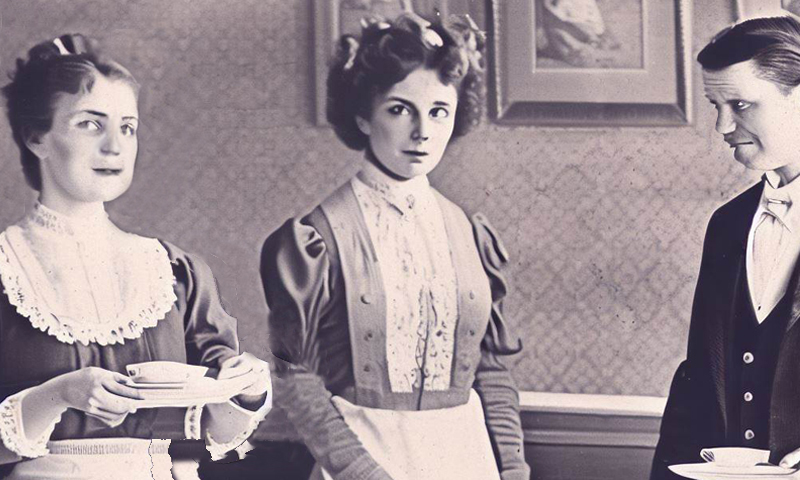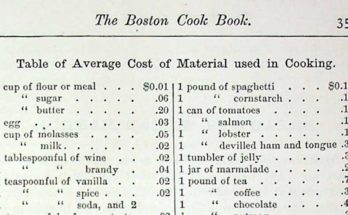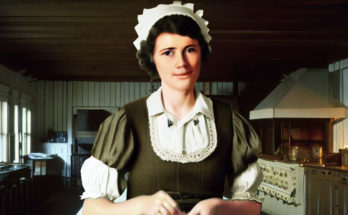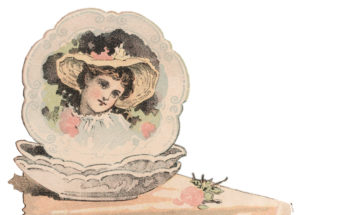
$10 Enough
Farewell to Boarding with Hotel Fare: Mrs. Bishop’s Yearning for a Charming Cottage
“Beef steak, cod steak, mutton chop, and hash!”
This bill of fare, glibly rattled off by a neat waitress, promised a very satisfying breakfast, supplemented as it was by abundant cream-of-tartar biscuit and potatoes. Yet Mrs. Bishop thought this morning, as she had done for three hundred out of the three hundred and sixty-five mornings she had heard it, she would gladly have exchanged all for a cup of really fine coffee, a fresh egg, and some good home-made bread and butter. Needless to say, Mr. and Mrs. Bishop were boarding, and doing so at a very good house, for the money they were able to pay,—$20 per week for the two. Yet to this couple, reared with luxury and refinement, the very abundance was nauseating.
“You ate no breakfast again, Puss. What am I to do with you?”
“Oh, I shall do very well. I am sure one has nothing to complain of, and if Mrs. Jones were to cater to our tastes she would not satisfy her other boarders.”
“Yes, there is a coarse substantial abundance about it, that always strikes me with wonder as to how it is done for the money”—
“And yet, Harry, wouldn’t you enjoy a nice little breakfast for our two selves? Oh, if we could only keep house!”
“My darling, I wish to keep house just as much as you do, but with my income such housekeeping would be very different from what you think. You would have to limit the clean table-cloths and napkins, and stint yourself in everything, to make both ends meet.”
“I wish I could convince you, Harry, that it need not be so. You don’t know what a good manager I should be.”
“Dear little woman, I couldn’t have you make a drudge of yourself, and believe me, you don’t realize the difference between practice and theory. I know several men who have good, self-denying wives, and just my income, but I could not look forward to the narrowness of such houses as theirs, nor wish to see you in one. While we are boarding we can’t pretend to have a home; there is no temptation to ask a friend to a meal, no shame if one comes and it isn’t good.”
Mrs. Bishop turned a smiling face on her husband.
“That is the secret, Harry. You are afraid of being ashamed of my housekeeping. Shall I promise you that you shall never dread to bring a friend home for fear of a soiled table-cloth, and a too economical dinner? I assure you I haven’t been to cooking-schools for nothing.”
“You dear enthusiast! If it were not for your own sake I’d let you try.”
Mrs. Bishop executed a little dance of joy.
“Oh, Harry, you can’t go back on that, you mustn’t! Do let us go through this winter in our own house.”
Mr. Bishop only said, taking out his watch—
“By Jove! I have only time to catch the car. Goodbye, dear.” Pressing a hearty kiss on her soft cheek, he rushed down the stairs and out of the house.
There was quite a little romance about this young couple, which I will relate here, that those who may follow the young wife’s trials and triumphs may understand some that she had to fear. Harry Bishop was the son of a prosperous merchant, who, as is the fashion in this America of ours, lived almost like a prince on the profits of his business, but, as his family was large, and his wife ambitious and extravagant, it was not very certain that he would be able to provide a fortune for each of his children. For this reason he and Mrs. Bishop were anxious that those children should marry money.
When Harry declared his intention of marrying, instead of the rich Miss Vanderpool his mother had looked out for him, pretty, penniless Molly Marsh, the anger and disappointment at home had been very great, and although it is not the fashion in this country to cast off the sons and daughters who make rash marriages, they did the next thing to it,—they disapproved so strongly that Molly rarely visited the grand home Harry had given up to marry her, and Harry’s father in his anger had said:
“Do you remember, sir, that your paltry salary wouldn’t pay the rent of a house in a decent location? and you propose to keep a wife on it! One thing you may be sure, ‘as you make your bed so you must lie,’ and when you have a mass of unpaid bills, you mustn’t look to me to pay ’em.”
“I never will, sir. I am sorry for Molly’s sake you take it like this, but I hope in time you will see that I am right to choose happiness instead of riches.”
And then Harry’s mother had pictured the sordid home kept on $100 a month, and derisively asked if he supposed he would be happy after the honeymoon was over, eating common coarse food in a shabby little dining-room.
“The idea of it! You are the last person, Harry, to content yourself in that way. Why, you criticize even my cook; how will you do with no cook at all?”
“I shouldn’t criticize, dear mother, if you did the cooking.”
They had been married a year now, and Molly and Harry paid rare visits to his father’s house, and she, poor young wife, was made to feel how much her husband had sacrificed for her, and she knew, good as Harry was, he would be rather exacting in his own home; that, though for love of her he might not express himself, small deficiencies would jar on him, and that in beginning to keep house she would be undertaking a great deal.
“But that will be my share. If by devoting time to my housekeeping, I can make Harry’s money go half as far again as it would otherwise do, I shall do as much as if I earned half as much as he.”
And so during that year of boarding and leisure, Molly had attended cooking-classes, with a married friend, and had gone home with her and they had practiced together. She had read, too, everything she could find about housekeeping, and Harry laughed, sometimes, till the tears ran down his cheeks at what he called her “paper housekeeping.”
Yet her pictures of that ideal home they were to have were very alluring to him too, and this particular morning, when their boarding-house life had lasted just one year, her words had taken deeper hold than ever before. That evening he returned with a very mysterious look on his face.
“What is the matter, Harry?” asked Molly, merrily. “What plot are you brewing?”
“How would you like to pass a winter in the country?”
“I shouldn’t mind. Why do you ask?”
“Because we can put your longed-for experiment to the test. John Winfield is going to take his wife to Europe on the first of September, and wants to let his cottage furnished for the bare rent he pays: $20 per month.”
“Oh, Harry! and we will take it? It is such a cozy little place.”
“Yes, dear, I think we may venture on this experiment. If it happens that we tire of housekeeping in a few months, we shall not be burdened with furniture that we don’t want, and if you are as happy as you think, we can take a little house and furnish it.”
Mrs. Bishop looked the joy she felt, and all that evening they were discussing plans and prospects.
Many of my readers will wonder, perhaps, why this young couple looked upon beginning housekeeping on Harry’s income as such a tremendous experiment, when so many live and bring up families on much less. But there was no disguising the fact that Harry’s bringing-up in his father’s luxurious house had made him fastidious, and he shrank from the too frugal table that he associated with such means, and, even more, the necessity of foregoing in his own house the refinement he had been accustomed to. This lack being in the house of another person irked him less.
Molly’s dread was mixed with a trembling desire to show her husband what sort of a wife he had married.
“I feel just a doll while boarding, with nothing to think of but my clothes. You don’t know whether I am fit to be a helpmeet or not,” she had often said, and he had replied, “My darling, I take it all on faith; you are too good for me, even if you could not sew on a button.”
But Molly’s trembling did not come from fear of facing life in a cottage. She knew herself, but she did think that Harry might grow to repent the step. She feared also the criticism of his mother, ever watchful for a trip on her part.`
Ah! what agony it would be to her, if her husband should ever regret the sacrifice he had made! But from such thoughts as these, that kept her awake far into the night while Harry slept soundly at her side, she would turn to a vision of herself as a triumphant little matron.
“I cannot fail! My time and ingenuity will certainly supply the deficiency of money.”
Molly had kept house for an invalid mother, who, for economy’s sake, had lived in a small French town, and after her mother’s death she had found herself forced to earn her living as governess, for her mother’s income died with her.
Thus, although she had often told Harry she could keep house, he had smiled, pinched her cheek, and told her she did not realize the difference between keeping house in France and doing so in America, with a newly imported [domestic] for aide de cuisine, and as Molly did not like to boast, she had to let him keep his own opinion. But oh, how she longed to show him what unknown resources lay within her! And now the chance was hers.
After the first joyful hour, she behaved very soberly. She would take as a matter of course all Harry’s misgivings as to the commissariat department, for I am sorry to say Harry Bishop, although a Harvard graduate, and a fairly intellectual young man, did think a great deal of the enjoyment of life consisted in a good table, by which he meant not good food only, but good cooking and dainty service, and how they were to have this on $100 per month he could not see, unless his income were all spent for servants and food. When he told this to Molly she said:
“No, I propose that we keep house, and spend exactly what we do for this one room and our board; that is, $80 per month. It must be divided in this way: $20 for rent (we must never go beyond that), $12 for servant, and $10 a week for housekeeping; that is, $77 a month. The three remaining dollars, with the four or five we now spend for car fare, will buy your commutation ticket.”
“$10 a week for housekeeping! I am afraid you’ll find that will make a poor show, little wife,” he said caressingly. “I shall think we are happy and fortunate, if the $20 we now allow for our clothes and outside expenses will cover the deficit at the end of the month.”
“You’ll see $10 is enough.”
He laughed good-humoredly.
“I guess, Pussy, we shall both see things grow ‘small by degrees and beautifully less,’ toward the end of each month.”
“We’ll hope not,” said Molly meekly, for now that she hoped her hour of trial and triumph was coming…


